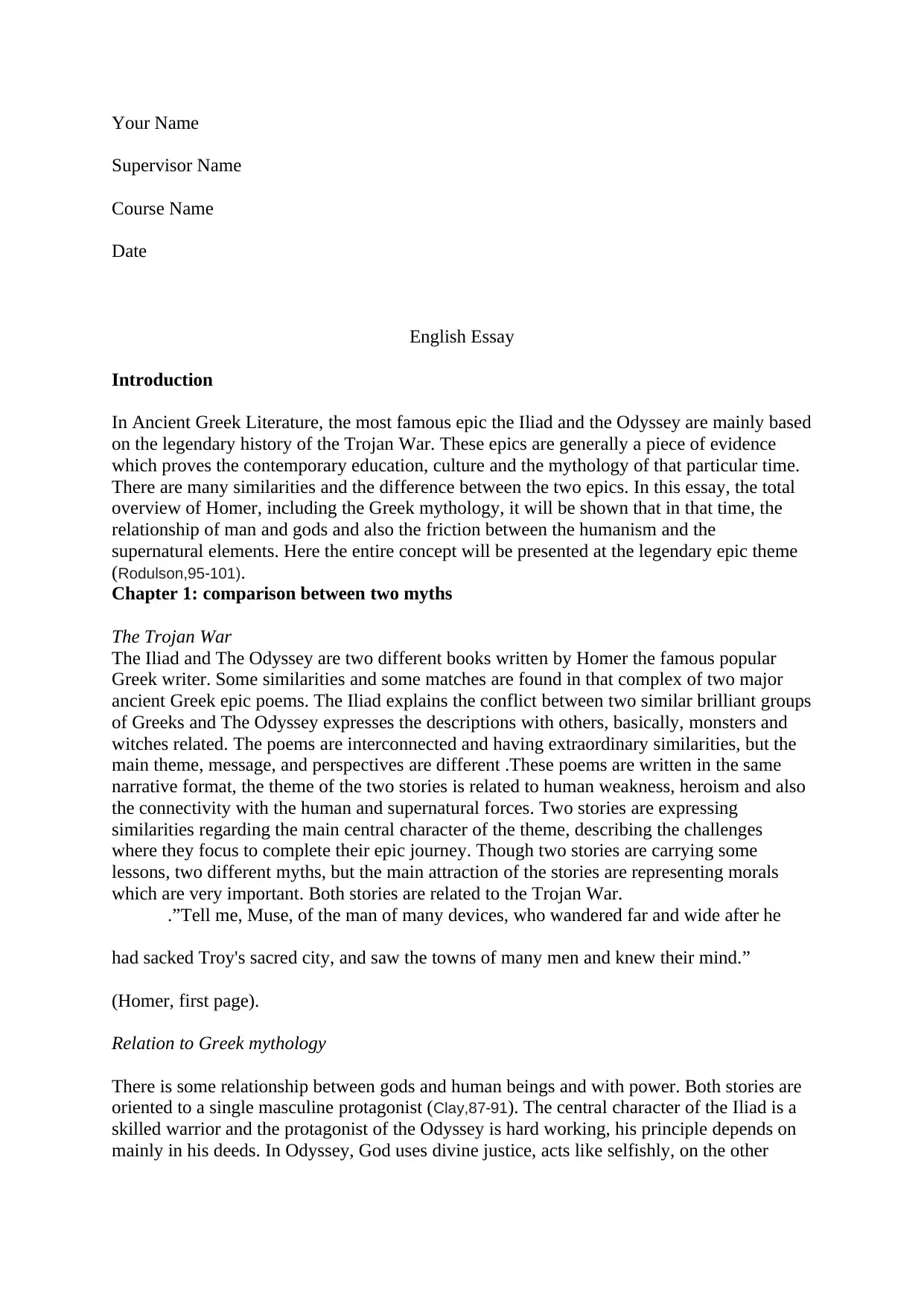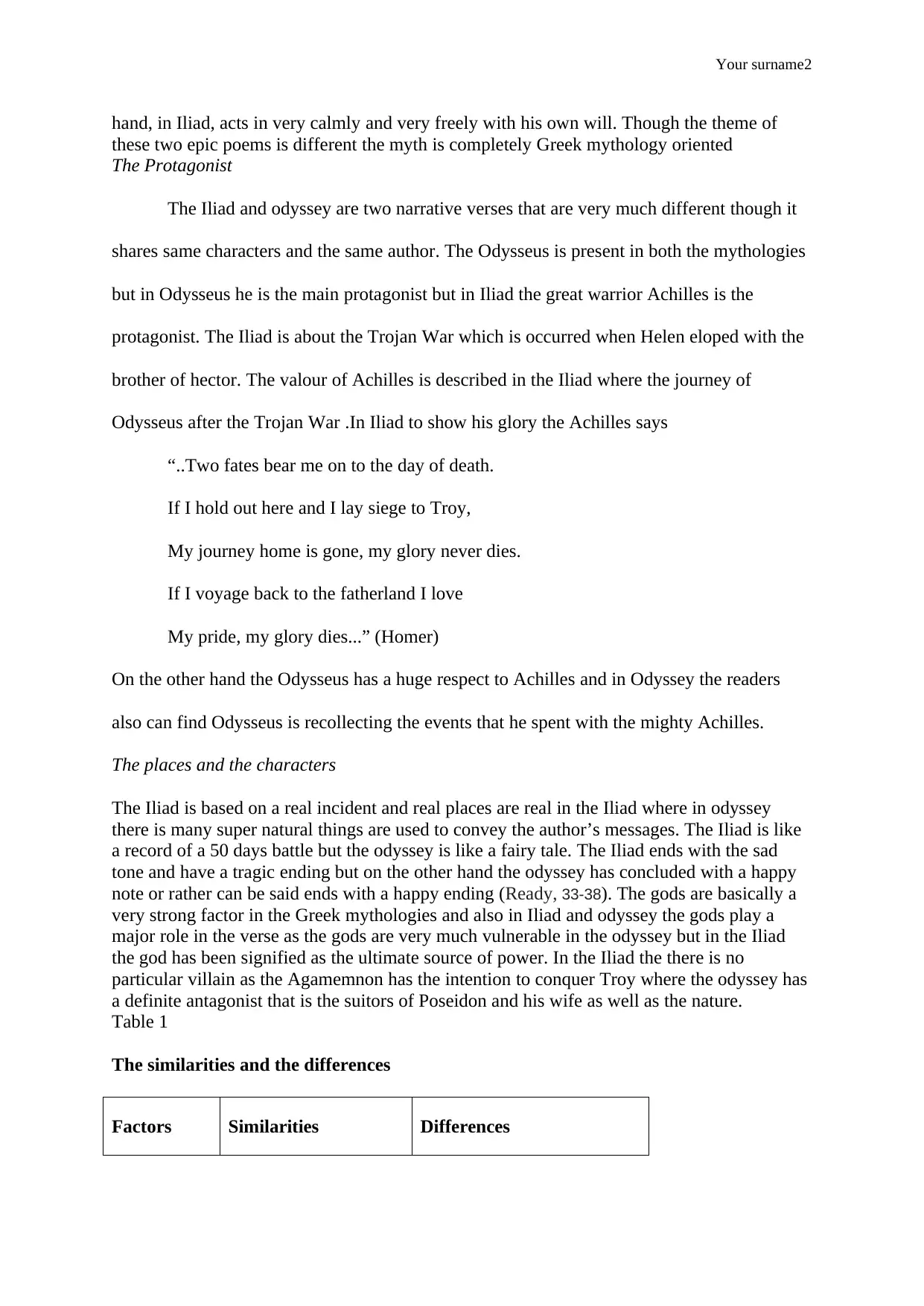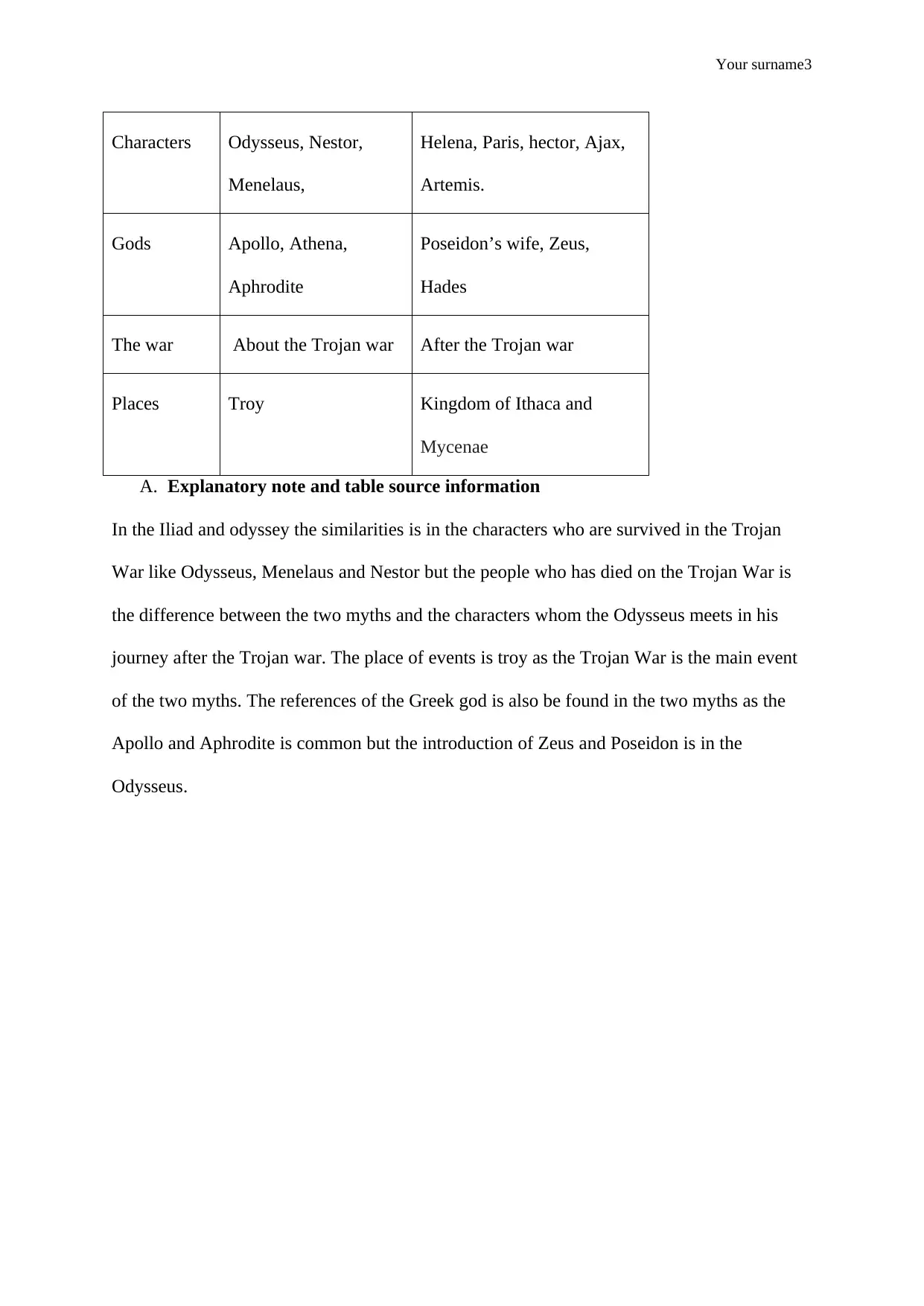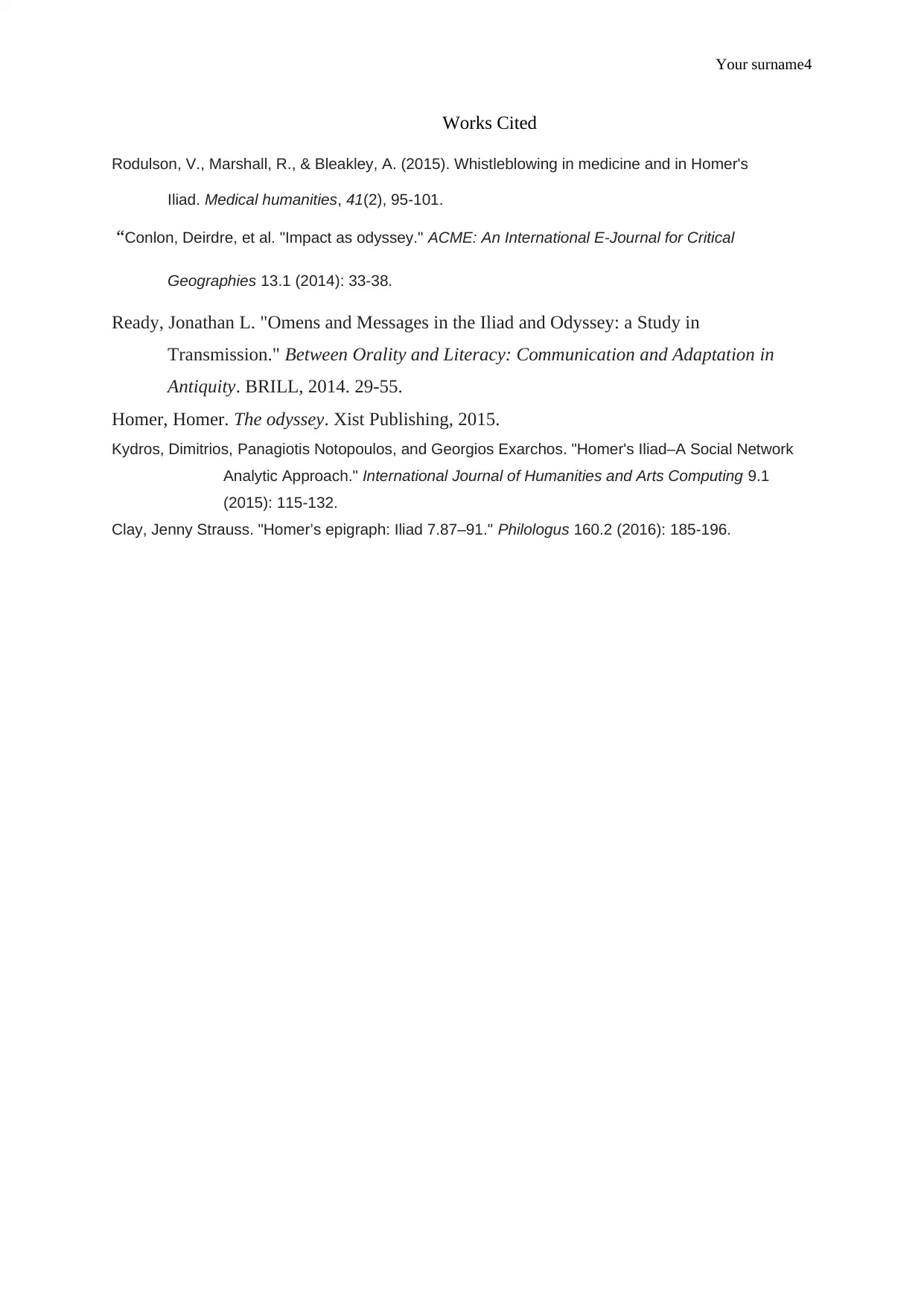Comparative Analysis: Exploring Themes in Homer's Iliad & Odyssey
VerifiedAdded on 2023/01/04
|4
|1203
|25
Essay
AI Summary
This essay provides a comparative analysis of Homer's Iliad and Odyssey, two foundational epics of Ancient Greek literature. It explores the similarities and differences in their themes, characters, and relationship to Greek mythology, particularly the interactions between gods and humans. The essay examines the Trojan War as a central event, highlighting the contrasting roles of protagonists Achilles in the Iliad and Odysseus in the Odyssey. Furthermore, the analysis delves into the narrative structure, the presence of supernatural elements, and the moral lessons conveyed in each epic. The essay concludes by summarizing the key differences in the settings, characters, and the portrayal of gods while emphasizing the enduring significance of these works in understanding ancient Greek culture and values. Desklib offers a wide range of academic resources, including essays and solutions, to support students in their studies.

Your Name
Supervisor Name
Course Name
Date
English Essay
Introduction
In Ancient Greek Literature, the most famous epic the Iliad and the Odyssey are mainly based
on the legendary history of the Trojan War. These epics are generally a piece of evidence
which proves the contemporary education, culture and the mythology of that particular time.
There are many similarities and the difference between the two epics. In this essay, the total
overview of Homer, including the Greek mythology, it will be shown that in that time, the
relationship of man and gods and also the friction between the humanism and the
supernatural elements. Here the entire concept will be presented at the legendary epic theme
(Rodulson,95-101).
Chapter 1: comparison between two myths
The Trojan War
The Iliad and The Odyssey are two different books written by Homer the famous popular
Greek writer. Some similarities and some matches are found in that complex of two major
ancient Greek epic poems. The Iliad explains the conflict between two similar brilliant groups
of Greeks and The Odyssey expresses the descriptions with others, basically, monsters and
witches related. The poems are interconnected and having extraordinary similarities, but the
main theme, message, and perspectives are different .These poems are written in the same
narrative format, the theme of the two stories is related to human weakness, heroism and also
the connectivity with the human and supernatural forces. Two stories are expressing
similarities regarding the main central character of the theme, describing the challenges
where they focus to complete their epic journey. Though two stories are carrying some
lessons, two different myths, but the main attraction of the stories are representing morals
which are very important. Both stories are related to the Trojan War.
.”Tell me, Muse, of the man of many devices, who wandered far and wide after he
had sacked Troy's sacred city, and saw the towns of many men and knew their mind.”
(Homer, first page).
Relation to Greek mythology
There is some relationship between gods and human beings and with power. Both stories are
oriented to a single masculine protagonist (Clay,87-91). The central character of the Iliad is a
skilled warrior and the protagonist of the Odyssey is hard working, his principle depends on
mainly in his deeds. In Odyssey, God uses divine justice, acts like selfishly, on the other
Supervisor Name
Course Name
Date
English Essay
Introduction
In Ancient Greek Literature, the most famous epic the Iliad and the Odyssey are mainly based
on the legendary history of the Trojan War. These epics are generally a piece of evidence
which proves the contemporary education, culture and the mythology of that particular time.
There are many similarities and the difference between the two epics. In this essay, the total
overview of Homer, including the Greek mythology, it will be shown that in that time, the
relationship of man and gods and also the friction between the humanism and the
supernatural elements. Here the entire concept will be presented at the legendary epic theme
(Rodulson,95-101).
Chapter 1: comparison between two myths
The Trojan War
The Iliad and The Odyssey are two different books written by Homer the famous popular
Greek writer. Some similarities and some matches are found in that complex of two major
ancient Greek epic poems. The Iliad explains the conflict between two similar brilliant groups
of Greeks and The Odyssey expresses the descriptions with others, basically, monsters and
witches related. The poems are interconnected and having extraordinary similarities, but the
main theme, message, and perspectives are different .These poems are written in the same
narrative format, the theme of the two stories is related to human weakness, heroism and also
the connectivity with the human and supernatural forces. Two stories are expressing
similarities regarding the main central character of the theme, describing the challenges
where they focus to complete their epic journey. Though two stories are carrying some
lessons, two different myths, but the main attraction of the stories are representing morals
which are very important. Both stories are related to the Trojan War.
.”Tell me, Muse, of the man of many devices, who wandered far and wide after he
had sacked Troy's sacred city, and saw the towns of many men and knew their mind.”
(Homer, first page).
Relation to Greek mythology
There is some relationship between gods and human beings and with power. Both stories are
oriented to a single masculine protagonist (Clay,87-91). The central character of the Iliad is a
skilled warrior and the protagonist of the Odyssey is hard working, his principle depends on
mainly in his deeds. In Odyssey, God uses divine justice, acts like selfishly, on the other
Paraphrase This Document
Need a fresh take? Get an instant paraphrase of this document with our AI Paraphraser

Your surname2
hand, in Iliad, acts in very calmly and very freely with his own will. Though the theme of
these two epic poems is different the myth is completely Greek mythology oriented
The Protagonist
The Iliad and odyssey are two narrative verses that are very much different though it
shares same characters and the same author. The Odysseus is present in both the mythologies
but in Odysseus he is the main protagonist but in Iliad the great warrior Achilles is the
protagonist. The Iliad is about the Trojan War which is occurred when Helen eloped with the
brother of hector. The valour of Achilles is described in the Iliad where the journey of
Odysseus after the Trojan War .In Iliad to show his glory the Achilles says
“..Two fates bear me on to the day of death.
If I hold out here and I lay siege to Troy,
My journey home is gone, my glory never dies.
If I voyage back to the fatherland I love
My pride, my glory dies...” (Homer)
On the other hand the Odysseus has a huge respect to Achilles and in Odyssey the readers
also can find Odysseus is recollecting the events that he spent with the mighty Achilles.
The places and the characters
The Iliad is based on a real incident and real places are real in the Iliad where in odyssey
there is many super natural things are used to convey the author’s messages. The Iliad is like
a record of a 50 days battle but the odyssey is like a fairy tale. The Iliad ends with the sad
tone and have a tragic ending but on the other hand the odyssey has concluded with a happy
note or rather can be said ends with a happy ending (Ready, 33-38). The gods are basically a
very strong factor in the Greek mythologies and also in Iliad and odyssey the gods play a
major role in the verse as the gods are very much vulnerable in the odyssey but in the Iliad
the god has been signified as the ultimate source of power. In the Iliad the there is no
particular villain as the Agamemnon has the intention to conquer Troy where the odyssey has
a definite antagonist that is the suitors of Poseidon and his wife as well as the nature.
Table 1
The similarities and the differences
Factors Similarities Differences
hand, in Iliad, acts in very calmly and very freely with his own will. Though the theme of
these two epic poems is different the myth is completely Greek mythology oriented
The Protagonist
The Iliad and odyssey are two narrative verses that are very much different though it
shares same characters and the same author. The Odysseus is present in both the mythologies
but in Odysseus he is the main protagonist but in Iliad the great warrior Achilles is the
protagonist. The Iliad is about the Trojan War which is occurred when Helen eloped with the
brother of hector. The valour of Achilles is described in the Iliad where the journey of
Odysseus after the Trojan War .In Iliad to show his glory the Achilles says
“..Two fates bear me on to the day of death.
If I hold out here and I lay siege to Troy,
My journey home is gone, my glory never dies.
If I voyage back to the fatherland I love
My pride, my glory dies...” (Homer)
On the other hand the Odysseus has a huge respect to Achilles and in Odyssey the readers
also can find Odysseus is recollecting the events that he spent with the mighty Achilles.
The places and the characters
The Iliad is based on a real incident and real places are real in the Iliad where in odyssey
there is many super natural things are used to convey the author’s messages. The Iliad is like
a record of a 50 days battle but the odyssey is like a fairy tale. The Iliad ends with the sad
tone and have a tragic ending but on the other hand the odyssey has concluded with a happy
note or rather can be said ends with a happy ending (Ready, 33-38). The gods are basically a
very strong factor in the Greek mythologies and also in Iliad and odyssey the gods play a
major role in the verse as the gods are very much vulnerable in the odyssey but in the Iliad
the god has been signified as the ultimate source of power. In the Iliad the there is no
particular villain as the Agamemnon has the intention to conquer Troy where the odyssey has
a definite antagonist that is the suitors of Poseidon and his wife as well as the nature.
Table 1
The similarities and the differences
Factors Similarities Differences

Your surname3
Characters Odysseus, Nestor,
Menelaus,
Helena, Paris, hector, Ajax,
Artemis.
Gods Apollo, Athena,
Aphrodite
Poseidon’s wife, Zeus,
Hades
The war About the Trojan war After the Trojan war
Places Troy Kingdom of Ithaca and
Mycenae
A. Explanatory note and table source information
In the Iliad and odyssey the similarities is in the characters who are survived in the Trojan
War like Odysseus, Menelaus and Nestor but the people who has died on the Trojan War is
the difference between the two myths and the characters whom the Odysseus meets in his
journey after the Trojan war. The place of events is troy as the Trojan War is the main event
of the two myths. The references of the Greek god is also be found in the two myths as the
Apollo and Aphrodite is common but the introduction of Zeus and Poseidon is in the
Odysseus.
Characters Odysseus, Nestor,
Menelaus,
Helena, Paris, hector, Ajax,
Artemis.
Gods Apollo, Athena,
Aphrodite
Poseidon’s wife, Zeus,
Hades
The war About the Trojan war After the Trojan war
Places Troy Kingdom of Ithaca and
Mycenae
A. Explanatory note and table source information
In the Iliad and odyssey the similarities is in the characters who are survived in the Trojan
War like Odysseus, Menelaus and Nestor but the people who has died on the Trojan War is
the difference between the two myths and the characters whom the Odysseus meets in his
journey after the Trojan war. The place of events is troy as the Trojan War is the main event
of the two myths. The references of the Greek god is also be found in the two myths as the
Apollo and Aphrodite is common but the introduction of Zeus and Poseidon is in the
Odysseus.
⊘ This is a preview!⊘
Do you want full access?
Subscribe today to unlock all pages.

Trusted by 1+ million students worldwide

Your surname4
Works Cited
Rodulson, V., Marshall, R., & Bleakley, A. (2015). Whistleblowing in medicine and in Homer's
Iliad. Medical humanities, 41(2), 95-101.
“Conlon, Deirdre, et al. "Impact as odyssey." ACME: An International E-Journal for Critical
Geographies 13.1 (2014): 33-38.
Ready, Jonathan L. "Omens and Messages in the Iliad and Odyssey: a Study in
Transmission." Between Orality and Literacy: Communication and Adaptation in
Antiquity. BRILL, 2014. 29-55.
Homer, Homer. The odyssey. Xist Publishing, 2015.
Kydros, Dimitrios, Panagiotis Notopoulos, and Georgios Exarchos. "Homer's Iliad–A Social Network
Analytic Approach." International Journal of Humanities and Arts Computing 9.1
(2015): 115-132.
Clay, Jenny Strauss. "Homer’s epigraph: Iliad 7.87–91." Philologus 160.2 (2016): 185-196.
Works Cited
Rodulson, V., Marshall, R., & Bleakley, A. (2015). Whistleblowing in medicine and in Homer's
Iliad. Medical humanities, 41(2), 95-101.
“Conlon, Deirdre, et al. "Impact as odyssey." ACME: An International E-Journal for Critical
Geographies 13.1 (2014): 33-38.
Ready, Jonathan L. "Omens and Messages in the Iliad and Odyssey: a Study in
Transmission." Between Orality and Literacy: Communication and Adaptation in
Antiquity. BRILL, 2014. 29-55.
Homer, Homer. The odyssey. Xist Publishing, 2015.
Kydros, Dimitrios, Panagiotis Notopoulos, and Georgios Exarchos. "Homer's Iliad–A Social Network
Analytic Approach." International Journal of Humanities and Arts Computing 9.1
(2015): 115-132.
Clay, Jenny Strauss. "Homer’s epigraph: Iliad 7.87–91." Philologus 160.2 (2016): 185-196.
1 out of 4
Related Documents
Your All-in-One AI-Powered Toolkit for Academic Success.
+13062052269
info@desklib.com
Available 24*7 on WhatsApp / Email
![[object Object]](/_next/static/media/star-bottom.7253800d.svg)
Unlock your academic potential
Copyright © 2020–2025 A2Z Services. All Rights Reserved. Developed and managed by ZUCOL.





